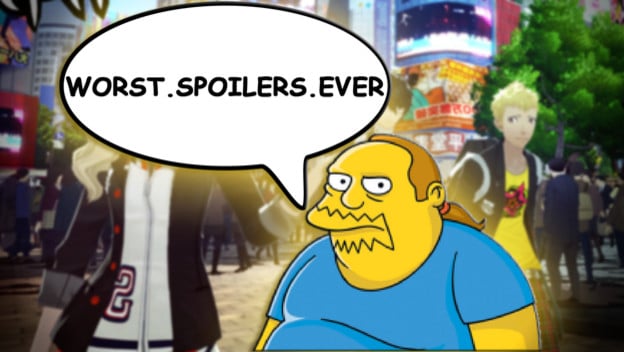Every time a big, new thing comes out, a war breaks out on social media and sometimes in real life. It’s an ever-running battle between people so excited about the super dope new thing they just want to shout about it and those who can’t get to that same thing right away and want the former group to shut the hell up about it. Why? Because spoilers.
People get super mad and super serious about spoilers, almost on a weekly basis. (Especially when a popular, lore-heavy TV show is airing). Spoilers are often cited as a reason video game publishers put so many bizarre restrictions of footage capture and streaming. But are spoilers really that big of a deal? I say no, they really aren’t. The element of surprise is not a reliable barometer for enjoying a piece of art. Something that’s actually a quality storytelling work should be able to stand on its merits, whether or not you already know what’s about to happen.
I’m thinking about this for a few reasons. When Persona 5 launched earlier in the year, there was tons of drama when Atlus issued streaming guidelines paired with weird, vague threats to anyone who didn’t abide. Recently, Nintendo removed live streaming of its games entirely from its revenue-sharing content creator program. Also, 2017 was a year of a new Game of Thrones season, and you couldn’t turn a corner during that without running into someone screaming about spoilers, especially after a few leak instances.
I think a few things are at work here. Firstly, spoilers appear to be a tool publishers are using to leverage control over people using their IP in creative ways. Copyright strikes don’t always work, so now adding a sort of moral dilemma to burden fanbases with is an effective strategy. Is it entirely in earnest? Maybe to an extent, but publishers are also concerned about losing control over marketing. It also feels like a worry that someone who watches a stream of a game will feel satisfied and decide purchasing a copy is no longer necessary. That seems a bit far-fetched, especially for an interactive medium. Outside of PR drama, there’s also this lionizing of the visceral thrill of surprise that has really taken off in recent years, with the rise of “prestige TV” and certain dramatic storytelling techniques.
That second point is why I brought Game of Thrones into the equation. Game of Thrones is not a show that holds up to scrutiny very well. When people talk about it, you’re either seeing discussions on whether or not it’s myopic schlock or how shocking it is that x character of the week died out of nowhere. Shock and trauma at the expense of both the audience and effective storytelling is in right now. It’s the reason you see people criticizing things like fluffy superhero movies for not having “consequences” (aka deaths) or so many shows following the Game of Thrones or Lost model and focusing more on what the week’s cliffhanger will be. But when you go back to these serialized event shows and put them under a microscope, you get a bunch of narrative dead ends that don’t mean anything, vapid exploitation, and one-dimensional characters.
What I’m getting at here is being surprised by something often overpowers our ability to really think about or appreciate something. Taking in a work of art is an emotional experience; sitting in a movie theater or playing a new game for the first time is often overwhelming and leads many of us to liking something the first time way more than we might revisiting it down the road. It’s not because you’re bored or less interested in revisiting old material, it’s because on a replay or rewatch, you’re much more capable of analyzing the true worth based on your tastes and values. You’ve taken in all the wild new experiences, which means now you can take a step back and actually think about it. This can especially be applied to video games, as the participatory element of holding that controller and causing the game to happen by your own hand is far more important than knowing plot details, even in a more story-driven experience such as a Persona 5 or The Witcher 3 .

I now point to a study I came across a while back that suggested exactly what I just described. A UC San Diego psychology professor by the name of Nicholas Christenfeld was curious about how the presence (or lack thereof) of spoilers affected peoples’ enjoyment of a story. While asking people if spoilers, well, spoiled a story, the answer was generally yes.
But after performing the study, the data showed a different result. Separated into spoiler and spoiler-free groups, participants were asked to rate their enjoyment of stories in various genres and the spoiler group consistently gave higher ratings. Sometimes, the stories were cut off before the spoiled endings, and the ratings were still higher. The study results argue again that knowing the gimmicky twists allow the audience to focus more on the actual storytelling and enhances their appreciation and engagement.
I don’t think knowing ahead of time you can play as a goomba and roll a giant corn cob through a puddle in Super Mario Odyssey or who the mystery villain is in a hundred-hour RPG before you sit down to play ruins the experience. I don’t think knowing about a high-profile character death going into a serial TV show does anything but expose how poor of a storytelling device that is. Storytelling is about craft; it’s about building and resolving a conflict through the eyes of characters built to be relatable and multi-dimensional. If all of the above is created with talent and quality, the story will resonate within your guts regardless of your prior knowledge. Otherwise, why bother going back to anything after you’ve taken it in once? The real treat is diving down and gaining a deeper understanding of the art we love. A surprise is merely a fleeting rush in comparison.
